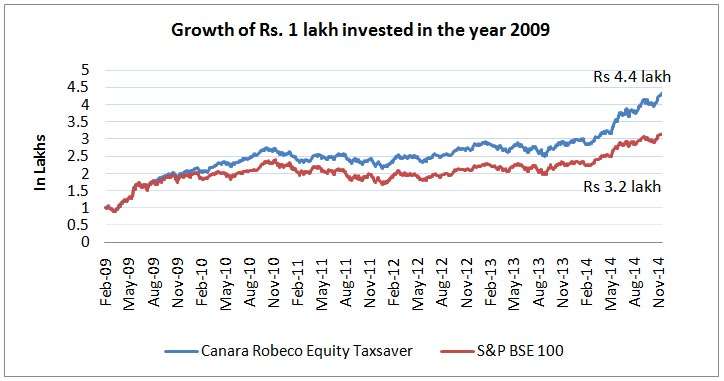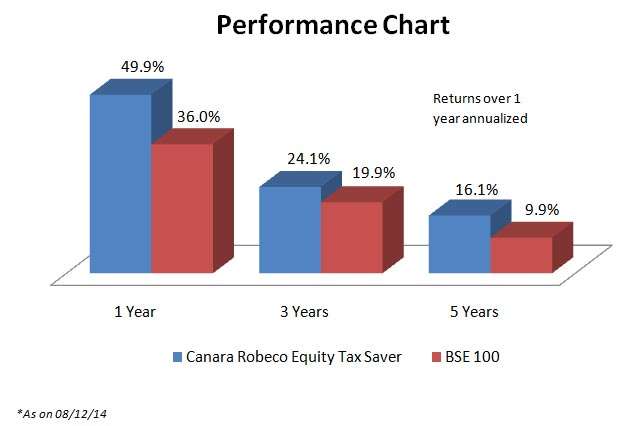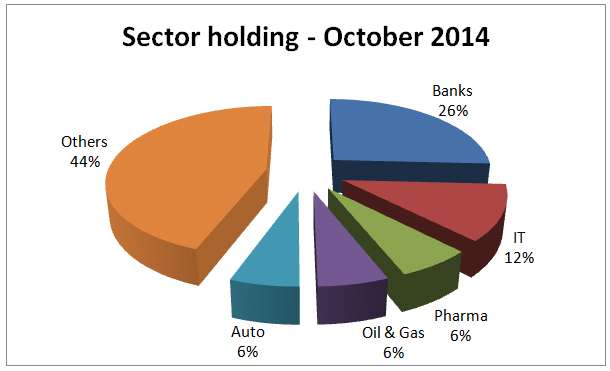Prajna Capital |
| Canara Robeco Equity Tax Saver - An ELSS Fund Posted: 01 Dec 2015 04:12 AM PST Canara Robeco Equity Tax Saver - Invest Online Canara Robeco Equity Tax Saver is a tax-saving fund that enjoys deduction (up to Rs 1.5 lakh) under Section 80C of the Income Tax Act. The fund benefits from long term investing due to its lock-in period, and has a balanced portfolio of large and mid cap stocks. It follows the 'growth' style of investing. Although Canara Robeco Equity Tax Saver is a diversified fund, it has a large cap bias. It takes tactical exposure towards mid- and small-cap stocks. The fund appears to be tilted in favour of growth-oriented sectors such as banking, IT, energy and auto sectors. We still recommend Axis Long Term Equity and ICICI Pru Tax Plan from the tax-saving basket. If you are looking for slightly conservative options, then Canara Robeco Equity Tax Saver is a good scheme to invest. Since this fund predominantly invests in large-cap stocks, it is known to contain downfalls during steep market corrections. At the same time, its one-third exposure in quality mid-cap picks during market upturns has aided performance. Performance
Canara Robeco Equity Tax Saver took some time to warm up to performance; however, it became a steady performer soon. During its initial years of inception (up to 2009), the fund underperformed in comparison to its category average and its respective index. Performance then picked up from 2009, and post 2009, the fund has been delivering consistent returns by outperforming its index by a good margin.
On a rolling one-year return basis (in the last 5 years), the fund beat its benchmark 82 per cent of the times. This is a good outperformance ratio. On a point-to-point basis, over the last 3 years and 5 years, the fund beat its benchmark with a good margin of 4 per cent and 6 per cent respectively. Portfolio Canara Robeco Equity Tax Saver's portfolio is adequately diversified. Its investment is spread across 14 sectors, with the top three sectors contributing to 51.4 per cent. The scheme's exposure to large caps is 64 per cent, while mid-cap and small-cap stocks constitute 31 per cent and 5 per cent respectively. Canara Robeco Equity Tax Saver gradually increased its mid- and small-cap exposure over the last few months. It held 53 stocks in its portfolio as of October 2014, and recently, it increased its exposure to banking and IT stocks. Currently banking, IT, energy, and auto are its top sector holdings. Canara Robeco Equity Tax Saver is under weight on the FMCG and metal sectors. Compared to its peer group, the fund churns its portfolio less often, with its portfolio turnover ratio being 0.89 times.
The top 10 stocks of the fund account for 40 per cent of the portfolio. HDFC Bank, ICICI Bank, Infosys and Reliance Industries are the top four holdings of Canara Robeco Equity Tax Saver. Ramco Cements, AIA Engineering, CMC Ltd. and IL&FS Transportation are few of the top mid-cap picks. Krishna Sanghvi has been managing the fund since 2012. Returns mentioned are past returns and are not indicative of future performance. Best Tax Saver Mutual Funds or ELSS Mutual Funds for 2015
1.ICICI Prudential Tax Plan 2.Reliance Tax Saver (ELSS) Fund 3.HDFC TaxSaver 4.DSP BlackRock Tax Saver Fund 5.Religare Tax Plan 6.Franklin India TaxShield 7.Canara Robeco Equity Tax Saver 8.IDFC Tax Advantage (ELSS) Fund 9.Axis Tax Saver Fund 10.BNP Paribas Long Term Equity Fund
You can invest Rs 1,50,000 and Save Tax under Section 80C by investing in Mutual Funds
Invest in Tax Saver Mutual Funds Online - For further information contact Prajna Capital on 94 8300 8300 by leaving a missed call --------------------------------------------- Leave your comment with mail ID and we will answer them OR You can write to us at PrajnaCapital [at] Gmail [dot] Com OR Leave a missed Call on 94 8300 8300 --------------------------------------------- Invest Mutual Funds Online Download Mutual Fund Application Forms from all AMCs |
| Posted: 01 Dec 2015 03:12 AM PST If you have stopped your Systematic Investment Plan (SIP) in an equity scheme after four years and sold your investments a year later, you don't have to pay any tax on your capital gains. This is because long-term capital gains are tax-free on equity investments held over a year. However, you should make sure that the last SIP instalment has completed a year before selling to qualify for long-term capital gains tax. Best Tax Saver Mutual Funds or ELSS Mutual Funds for 2015
1. BNP Paribas Long Term Equity Fund 2. Axis Tax Saver Fund 3. IDFC Tax Advantage (ELSS) Fund 4. ICICI Prudential Long Term Equity Fund 5. Religare Tax Plan 6. Franklin India TaxShield 7. DSP BlackRock Tax Saver Fund 8. Birla Sun Life Tax Relief 96 9. Reliance Tax Saver (ELSS) Fund 10. HDFC TaxSaver
Invest Rs 1,50,000 and Save Tax under Section 80C. Get Good Returns by Investing in ELSS Mutual Funds Online
Invest in Tax Saver Mutual Funds Online For further information contact Prajna Capital on 94 8300 8300 by leaving a missed call --------------------------------------------- Leave your comment with mail ID and we will answer them OR You can write to us at PrajnaCapital [at] Gmail [dot] Com OR Leave a missed Call on 94 8300 8300 |
| Posted: 01 Dec 2015 02:14 AM PST Your monthly credit card statement is the best document that will help you understand your monthly spending and also help keep a check on it, if it is not in line with your budget. By reading and understanding the fine print (especially the fine print) ofWhen was the last time you took a detailed and unhurried look at your credit card statement? Do you understand every printed detail that appears on your credit card? Your monthly credit card statement is the best document that will help you understand your monthly spending. By reading and understanding the fine print of your statement, you will be practicing proper credit card management. It will also help you learn how your credit card program works. What is a credit card statement?
A credit card statement is the monthly billing statement you receive from your credit card issuer. It lists all the transactions done using your credit card, and the total outstanding balance, payment date etc.
The credit card statement essentially has two parts. One is the payment coupon which you detach and enclose with your payments. The second and the most important part of your credit card statement is where your credit activity is listed. Let's examine this part in detail now. Name and Address: This is the card holder's name and full address as per the card issuer's records. The only thing you should keep in mind is that, if there is any change of address, you should immediately notify your card issuer/bank in writing and get acknowledgement.
Reference Number: This is the number you will need to quote in case of dispute on any of charges listed in that particular credit card statement.
credit card Number: Most of the credit cards have a unique 16-digit number assigned to your credit card, usually super-imposed across the credit card. Some credit cards such as American Express (Amex) have a 15-digit number. You need to quote this number your cheque or demand draft while making payments and also for correspondence with the card issuer.
Credit Limit: Credit limit is the maximum amount your credit card allows you to borrow, whether as credit against goods purchased or/and cash withdrawn. The card issuing bank can revise credit limit based on your payment track-record.
Available credit limit: It is the difference between your credit limit and total amount due. If your credit limit is Rs. 50,000 and you have spent Rs. 1,500, your available credit limit reduces to 48,500.
Cash limit: The cash limit sets the maximum cash you can withdraw using your credit card. Your cash limit is a part of your credit limit and is necessarily lower than your credit limit. Consider a credit limit of Rs. 50,000 and cash limit of Rs. 20,000. If you have exhausted your credit limit of Rs. 50,000 by making purchases on your credit card, you cannot withdraw cash using your credit card, even if you have not used your cash limit at all.
Statement Date: This is the date on which your bill is generated. This is also the date used to calculate interest rate if you do not pay the full outstanding amount by the payment due date. This is true even if the due date falls many weeks after the statement date.
Payment Due Date: This is the date before which your payment should be credited at the bank. Note that this is NOT the date your bill has to be postmarked, or even the date it arrives at the company's office. Hence, be sure that your cheque/DD/ or cash payment is credited at the bank well before the due date so that no late payment fee is levied on you.
Total Amount Due: This is the total bill amount to be paid - the total unpaid accumulated amount outstanding in your credit card account, including interest and any other charges like late payment fee. Minimum Amount Due: It is the minimum amount required to be paid to keep your account in a good credit standing. This amount is usually 5% to 20% of your total amount due. If you do not pay the minimum amount due by payment due date, it will be considered as a default and levied a late payment fee.
Tip to remember: Even if you pay the minimum amount due, you will be charged interest on the total amount due (including the minimum amount due that you paid). If you do not want to pay interest you have to pay the entire total amount due before the payment due date. Even if you have paid 95% of the total amount due before due date and but there is still some small amount pending, you will be charged interest for the full total amount due.
Rewards Point Summary: This is the record of the rewards points you have earned/redeemed till date. The summary usually gives an account of your opening balance and the points or credits earned or redeemed. You should not confuse reward points with credit limit or balance outstanding. Reward points and the method of redemption vary from one credit card to another.
Transaction Details: The transaction details will have the date of transaction, place of transaction (where you spend the money) and the transaction amount. This helps you verify the charges credited to your card. It is important that you check your credit card transaction details regularly. This is the only way you will come to know if some transaction has been fraudulently credited to your card. Best Tax Saver Mutual Funds or ELSS Mutual Funds for 2015
1. BNP Paribas Long Term Equity Fund 2. Axis Tax Saver Fund 3. IDFC Tax Advantage (ELSS) Fund 4. ICICI Prudential Long Term Equity Fund 5. Religare Tax Plan 6. Franklin India TaxShield 7. DSP BlackRock Tax Saver Fund 8. Birla Sun Life Tax Relief 96 9. Reliance Tax Saver (ELSS) Fund 10. HDFC TaxSaver
Invest Rs 1,50,000 and Save Tax under Section 80C. Get Good Returns by Investing in ELSS Mutual Funds Online
Invest in Tax Saver Mutual Funds Online For further information contact Prajna Capital on 94 8300 8300 by leaving a missed call --------------------------------------------- Leave your comment with mail ID and we will answer them OR You can write to us at PrajnaCapital [at] Gmail [dot] Com OR Leave a missed Call on 94 8300 8300 |
| You are subscribed to email updates from Prajna Capital - An Investment Guide. To stop receiving these emails, you may unsubscribe now. | Email delivery powered by Google |
| Google Inc., 1600 Amphitheatre Parkway, Mountain View, CA 94043, United States | |



No comments:
Post a Comment